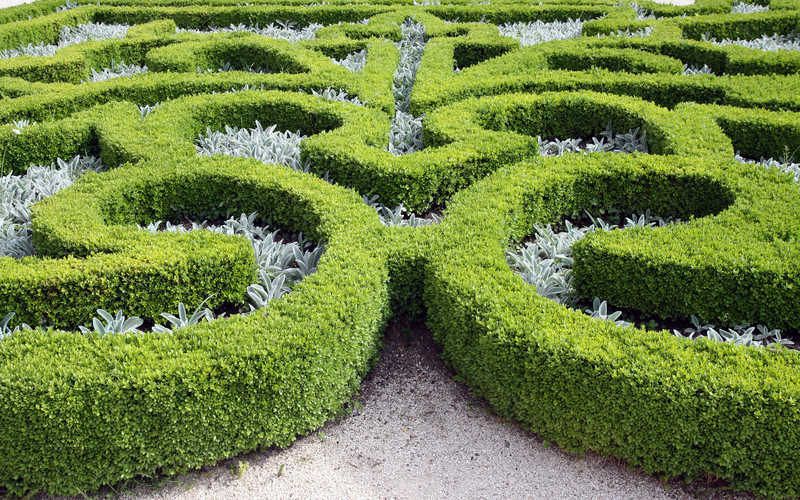Harmonize Your Garden with Calming Zen Inspirations
Posted on 19/06/2025

Harmonize Your Garden with Calming Zen Inspirations
Creating a tranquil oasis in your own backyard is no longer a dream reserved for distant lands or luxury resorts. The essence of Zen garden inspirations lies in crafting spaces that radiate calm, encourage mindfulness, and invite harmony between nature and the soul. By blending traditional elements with personalized touches, you can transform your garden into a haven of peace, reflection, and natural beauty.
- What is a Zen Garden?
- Core Elements of a Calming Zen-Inspired Garden
- Steps to Harmonize Your Garden with Zen Inspirations
- Choosing Materials and Plants for Serenity
- Zen Garden Decor and Features
- Maintaining Harmony in Your Zen Garden
- Spiritual & Wellness Benefits of Zen-Inspired Gardens
- Conclusion
What is a Zen Garden?
A Zen garden, also known as a Japanese rock garden or karesansui, is a minimalist landscape created to foster contemplation, meditation, and spirituality. Integrating calming Zen inspirations into your personal green space means focusing on simplicity, balance, and the natural flow of energy. These gardens are characterized by their use of rocks, sand, gravel, moss, and carefully selected plants--all thoughtfully arranged to create a serene environment.
Core Elements of a Calming Zen-Inspired Garden
When you decide to harmonize your garden with calming Zen garden inspirations, it is essential to understand the elements that make these spaces unique. Each feature plays a vital role in crafting an atmosphere of tranquility.
1. Rocks and Stones
- Symbolize mountains, islands, or animals.
- Arranged in groups or asymmetrically for natural aesthetics.
- Provide texture and act as a grounding element.
2. Water Elements
- Represent the flow of life and promote relaxation.
- Can include ponds, flowing streams, or simply the raked patterns of sand mimicking water.
- Encourage reflection and soothing sounds.
3. Sand and Gravel
- Signify rivers, seas, or the concept of emptiness.
- Carefully raked into patterns--waves, ripples, or concentric circles--to induce meditation.
4. Minimalist Plants
- Moss, bamboo, ferns, and evergreens are preferred.
- Offer lush greenery without overwhelming the senses.
- Emphasize year-round beauty and endurance.
5. Pathways and Stepping Stones
- Guide movement and contemplation around the garden.
- Encourage mindful walking or slow pacing for meditation.
6. Decor and Ornaments
- Subtle features like lanterns, bridges, and statues enhance Zen ambiance.
- Should be incorporated thoughtfully to avoid cluttering the space.
Steps to Harmonize Your Garden with Zen Inspirations
Step 1: Assess Your Space and Analyze Sunlight
Begin by evaluating your garden's layout--size, natural features, and the light patterns throughout the day. Zen gardens flourish in sun-dappled areas, but shaded corners can offer pockets of cool serenity. Documenting your observations will help you plan a harmonious garden design.
Step 2: Define the Purpose
Do you desire a spot for quiet meditation, a scenic retreat, or a balanced play space for the family? Clarifying your intentions ensures your Zen-inspired garden aligns with both your aesthetic and practical needs.
Step 3: Plan Your Layout
- Sketch layouts: Use graph paper or digital tools to visualize arrangements of rocks, sand, and plants.
- Consider focal points: Place a large rock, lantern, or water feature as a visual anchor.
- Include paths: Map where stepping stones or gravel walkways will invite meandering.
Step 4: Prepare and Shape the Land
Clear weeds, define boundaries with natural edging, and shape mounds or depressions to add texture. Physical contours in the landscape create subtle layers, deepening the calming garden effect.
Step 5: Install Hardscape Features
- Arrange rocks and stones in natural, asymmetrical groupings, respecting empty space as much as the forms themselves.
- Set up water features, lanterns, or bridges after establishing stone placements.
Step 6: Lay Down Sand or Gravel
Spread a fine gravel or sand base, keeping the depth consistent. Use a rake to form soft, flowing patterns that mimic the rippling effect of water--a signature feature of calming Zen gardens.
Step 7: Plant Thoughtfully
- Keep plant choices minimalist. Bamboo, moss, Japanese maples, and low-maintenance evergreens work beautifully in a peaceful Zen retreat.
- Emphasize seasonal interest and evergreen foliage for year-round tranquility.
- Space plants evenly for a clean, uncluttered look.
Step 8: Add Finishing Touches
Finally, integrate small ornaments, seating, or subtle lighting. Remember--less is more. Each addition should evoke serenity without overpowering the garden's simplicity.
Choosing Materials and Plants for Serenity
The right materials and plant selections are vital when designing a Zen-inspired, calming garden space. Focus on natural, muted hues, and textures that complement both each other and the wider surroundings.
Best Materials for a Harmonious Zen Garden
- Rocks and pebbles: Granite, sandstone, and river stones evoke timelessness and strength.
- Sand and gravel: White or grey, offering a refined reflectiveness and ease of raking.
- Bamboo: For fencing, water spouts, or simple screens, enhancing the garden's Japanese feel.
- Natural wood: For seats, arbors, or paths.
- Moss: Softens hardscaping and provides beautiful, year-round greenery.
Ideal Plants for Zen Garden Harmony
- Moss (Hypnum, Dicranum): Brings lush visual calm and thrives in shady, moist conditions.
- Bamboo (Phyllostachys): Delicate leaves and upright stems offer gentle movement in the breeze.
- Japanese Maple (Acer palmatum): Offers colorful foliage and elegant branching patterns, especially in autumn.
- Evergreen Azaleas (Rhododendron): Provide gorgeous, low-maintenance blooms.
- Ferns: Add feathery texture and thrive in shaded garden areas.
- Pine (Pinus): Symbolizes longevity and peace in traditional Zen design.
Tips for Selecting Zen Garden Plants
- Choose plants with calming colors: Greens, whites, and soft purples or pinks evoke tranquility.
- Opt for perennials and evergreens: Maintain beauty year-round with minimum effort.
- Group plants: Larger masses of the same species reinforce simplicity and balance.
- Include shade lovers: Ferns, mosses, and hostas help cool the environment.
Zen Garden Decor and Features
Creating harmony in your Zen-inspired retreat goes beyond rocks and raked sand. Select features that serve both an aesthetic and functional role, amplifying the garden's tranquil vibe.
- Stone lanterns (toro): Offer a soft focal point and nighttime ambiance.
- Bamboo water fountains (shishi-odoshi): Create gentle, rhythmic sounds that mask distractions.
- Bridges: Symbolize journeys and transitions.
- Basins (tsukubai): Used traditionally for ritual cleansing--a reflective, meditative feature.
- Zen statuary: Subtle Buddhas or animal figurines reinforce spiritual themes.
- Wooden benches: Provide restful spots to appreciate scenery and meditate.
- Subdued lighting: String lights, stone lanterns, or solar lamps highlight features without glare.
Practical Zen Garden Additions
- Wind chimes: Their gentle melodies soothe the mind, enhancing peaceful moments.
- Trellises and screens: Create privacy and define zones within the landscape.
- Rain chains: Guide water in aesthetically pleasing ways during rainfall.
Remember, in Zen design, each decorative item should hold meaning, furthering the harmony and intent of the garden as a place of calm.
Maintaining Harmony in Your Zen Garden
Zen gardens require care but not constant fuss. The art lies in balancing maintenance with the natural ebb and flow of outdoor life. Regular but mindful upkeep preserves your garden's tranquility and extends its beauty year-round.
- Rake sand or gravel often: Refreshes patterns and clears debris, encouraging a meditative rhythm.
- Weed regularly: Zen landscapes prize cleanliness; stay ahead of intrusive grasses or plants.
- Trim plants for structure: Prune lightly to retain shapes without harsh lines.
- Clean water features: Prevent algae build-up for clarity and healthy sound movement.
- Minimal watering: Many Zen plants are drought-tolerant; overwatering disrupts their health and garden design.
- Seasonal checks: Remove fallen leaves and inspect the integrity of stone or wooden features after storms.
Tips to Sustain Calming Zen Garden Inspirations
- Embrace imperfections: Allow moss and lichen to grow for an aged, natural look.
- Adapt with the seasons: Swap accents or add potted plants to reflect seasonal changes.
- Practice restraint: Resist filling open spaces--emptiness is as crucial as fullness in Zen philosophy.
Spiritual & Wellness Benefits of Zen-Inspired Gardens
Harmonizing your garden with calming Zen inspirations offers much more than a beautiful landscape. These gardens are therapeutic sanctuaries that encourage holistic well-being for mind, body, and spirit.
- Reduces stress: Quiet, natural settings lower blood pressure and soothe frazzled nerves.
- Boosts mindfulness: Meditative raking, pruning, and stillness cultivate presence and focus.
- Enhances creativity: Silent contemplation in nature sparks new ideas and problem-solving.
- Fosters connection: Sharing your Zen garden with others can deepen relationships through shared calm and quiet.
- Improves health: Fresh air, gentle exercise, and sunlight promote immunity and mood upliftment.
By bringing the philosophy of Zen--balancing opposites, seeking simplicity, observing natural forms--into your garden, you nurture not only your landscape but also your daily life.
Conclusion: Experience the Tranquil Harmony of Zen in Your Garden
Embracing calming Zen inspirations for your home garden opens the door to a sanctuary that nourishes peace, reflection, and harmony. By thoughtfully selecting materials, plants, and decor, and maintaining a spirit of simplicity, you ensure your outdoor space becomes a beloved retreat for years to come. Whether your garden is expansive or modest, anyone can create a harmonious Zen-inspired haven.
Start your journey to a calming Zen garden today--allow nature's tranquility to flow into your heart, your home, and your life.

Latest Posts
Enhancing Garden Vitality: Solutions for Windy Areas
Innovative Solutions to Reclaiming a Neglected Garden
Designing Interactive Gardens for Little Adventurers

